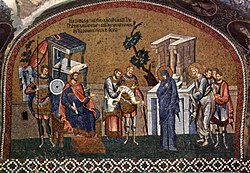Quirinius
Gaius Sentius Saturninus Quirinius (c. 51 BCE – 21 CE) was a Roman official and military leader who served as governor of Syria. He is known for his role in the census of Judea, which is a significant event in the context of early Christianity.
Early life and career
Quirinius was born Gaius Sentius Saturninus, but he is most commonly referred to by his later name, Quirinius, after he was adopted by a prominent Roman family. His early career included various military and administrative positions that prepared him for his later roles in the Roman government. He held several significant offices, including tribune and quaestor, which provided him with experience in governance and military affairs.
Governorship of Syria
Quirinius is most notable for his tenure as the governor of Syria, which he held from 6 CE to 12 CE. His governorship is remembered primarily for the role he played in the census of Judea around 6 CE. This census was part of a broader effort by the Roman Empire to consolidate control over its provinces and was significant because it was one of the first major administrative actions in Judea following its annexation by Rome.
The census is mentioned in the New Testament of the Bible, particularly in the Gospel of Luke, which records that the census was the reason for Joseph and Mary traveling to Bethlehem, where Jesus was born. This connection has made Quirinius a notable figure in Christian tradition, although historical records about him are relatively sparse and sometimes contradictory.
Controversies and historical debate
The historical record about Quirinius is complex and occasionally contradictory. The census of Judea is a point of contention among scholars because it is believed that Quirinius's governorship of Syria began in 6 CE, but historical records suggest that Herod the Great, the ruler of Judea at the time, died in 4 BCE. This raises questions about the exact timing of the census mentioned in the New Testament. Some scholars suggest that there may have been more than one census or that there may be chronological discrepancies in the biblical narrative.
Later life and legacy
After his term as governor, Quirinius continued to serve Rome in various capacities, including as a military leader and administrator. His later career was marked by continued service in the provinces, contributing to Rome’s military and administrative efforts.
Quirinius died in 21 CE. His legacy is primarily preserved through historical texts and religious references, particularly in Christian traditions that associate his census with the nativity of Jesus.
Quirinius Media
Mary and Joseph register for the census before Governor Quirinius. Byzantine mosaic at the Chora Church, Constantinople 1315–1320.
